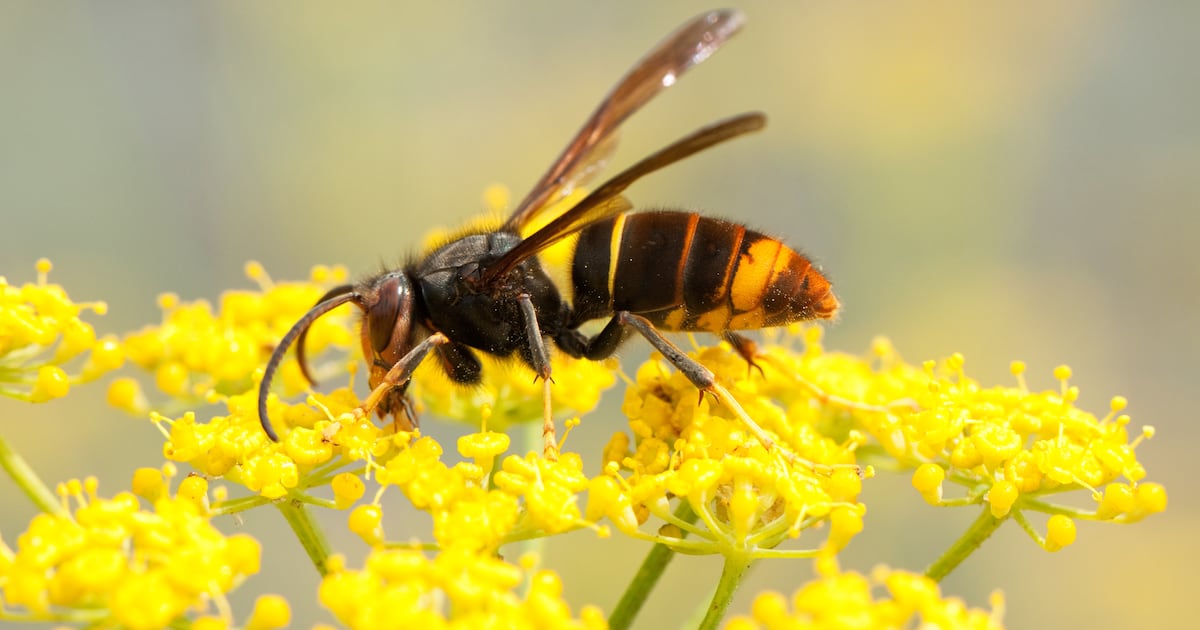If Asian hornets were to spread across Ireland, it would be a “disaster” for bees and biodiversity in general, one expert has said.
Frankie de Dobbelaere, a member of the Louth Beekeepers Association, has completed a hornet eradication course in Belgium and worked with other beekeepers to track hornets in the Netherlands.
On Thursday, the National Parks and Wildlife Service (NPWS) confirmed it had located an Asian hornet nest in Cork City.
Ms de Dobbelaere said this development is “not only a concern for beekeepers, but also for our biodiversity – because one such nest can consume 12 or more kilograms of insects”.
She told The Irish Times that Asian hornets primarily feed on bees because they are “easy prey” and often “concentrated” in one area, but they will also eat other insects.
An Asian hornets’ nest can contain hundreds or thousands of hornets, she said, noting that one found in Belgium last November contained 1,700 hornets.
In the coming months hornets will emerge from their nests and, once they mate, the males will die. The queens, if they have enough food, will survive and “search for a place to hibernate, and might find a new nest”, Ms de Dobbelaere said.
The insect, native to southeast Asia, has spread through continental Europe. It kills honeybees and wild bees, with control efforts ongoing in the UK to prevent the establishment of colonies there.
The sighting of an Asian hornet in Cork earlier this month triggered the creation of a taskforce to co-ordinate the State response.
Christopher O’Sullivan, Minister of State for Nature, Heritage and Biodiversity, confirmed a nest was found in the southside of Cork City after an “intensive effort” by the NPWS.
Speaking on RTÉ’s Morning Ireland, Mr O’Sullivan said he “can’t give away the exact location for obvious reasons” but that it was near where the original hornet was sighted.
“I know people may be alarmed and may be alerted by the fact that we now have a confirmed sighting of an Asian hornet nest because of the devastating impacts that an Asian hornet outbreak would have on biodiversity and nature in general. But it is a success story.”
Mr O’Sullivan said queen hornets, if they get out into wider circulation, may build their own nests, causing the population to multiply. However, they tend to leave their nests later in the autumn.
“We can’t say with absolute certainty – and there’s still a lot of work and investigative work to be done here – but we can say that usually these queens leave their nest much later in the autumn.”
The junior minister praised the “quick” work of NPWS rangers who located the nest. He said the nest will be “destroyed” and DNA tests will be carried out on the hornets to find out where they originated from.
It is not yet clear how these hornets arrived in Cork but, in other European countries, some hornets arrived in shipments from Asia.
Ms de Dobbelaere advised people who are returning to Ireland via ferry from the UK or Europe to check their cars, in case a hornet entered their vehicle at some stage of their journey. She said any potential hornet sightings should be reported to the NPWS “without any delays” so authorities can track the insects.
The Asian hornet is not aggressive but will sting if provoked, so people should not approach them. Such hornets are often confused with non-invasive species such as the giant woodwasp, the dark giant horsefly and the common wasp.
Asian hornets are also known as yellow-legged hornets due to the distinctive yellow or orange colouring on their legs and part of their abdomen.

